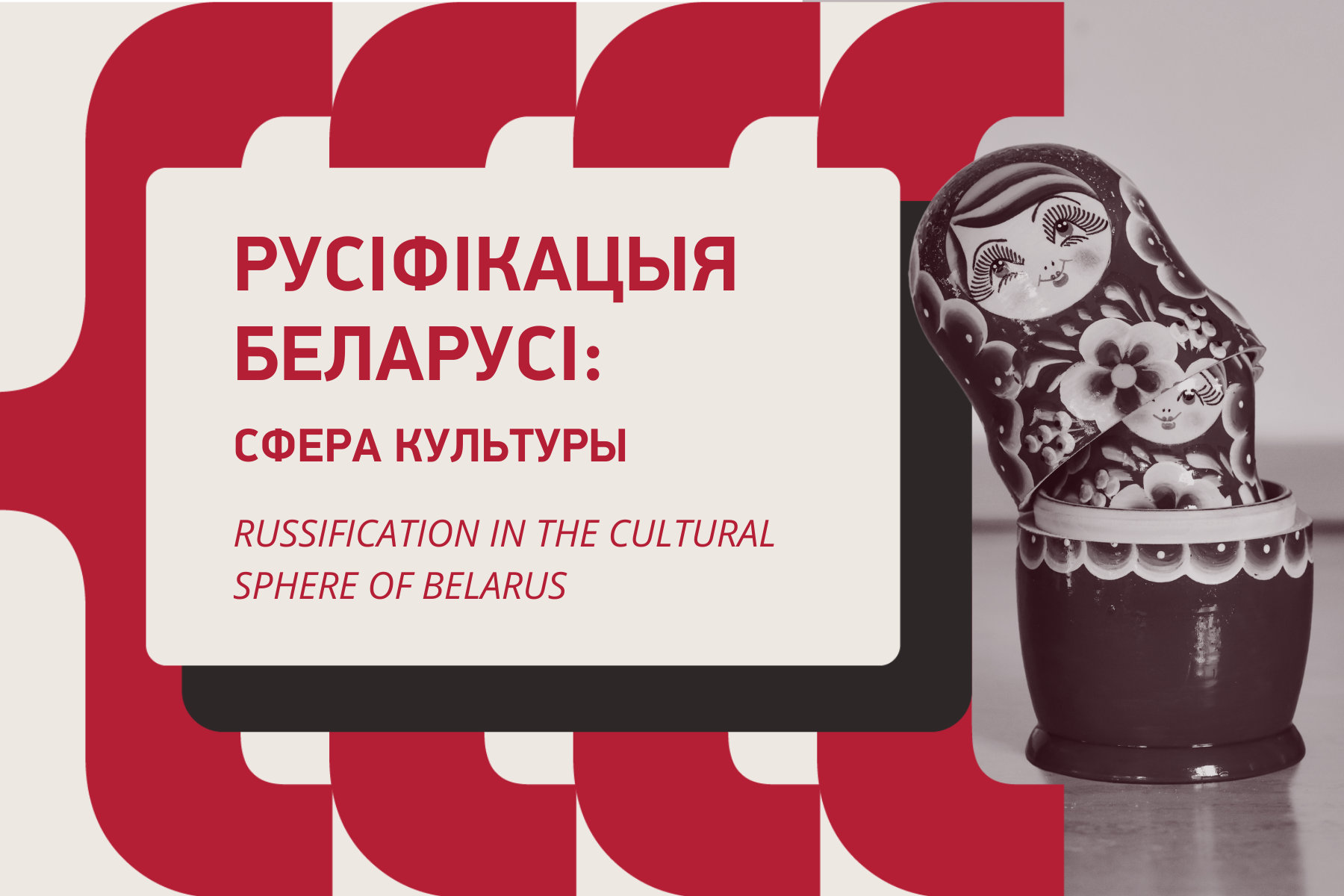
 In the photo: Russian actor Marat Basharov on tour at the Musical Theatre (https://musicaltheatre.by/)
In the photo: Russian actor Marat Basharov on tour at the Musical Theatre (https://musicaltheatre.by/)
Introduction
Union State: activities and projects in the field of culture and education
Rossotrudnichestvo: Russian Houses in Belarus
Theaters
Exhibitions, museums
Music
Conclusion
The reason for writing this overview is the growing presence of russkiy mir (“Russian world”) in general and the products of Russian culture in particular in Belarus, which contribute to the increasing de-Belarusisation of the country through its Russification. Even though Russification is not a new threat for Belarus, one could observe certain strengthening and acceleration of this process after the falsified 2020 presidential elections and Putin’s support of the forceful suppression of the Belarusian peaceful protests. It strengthened even more after the Belarusian regime became a co-aggressor in the war unleashed by the Russian Federation against Ukraine in February 2022, causing Belarus to terminate cooperation with European states and thus deepening its isolation from the civilised world. In February 2023, independent media published information about an internal document presumably prepared by the Russian authorities. Dated 2021, it contains the plan for absorbing Belarus in the spheres of culture, social policy, legislation, economy, and army by 2030. The plan envisages as its goal the creation of the so-called federal state of Russia and Belarus. While it is not possible to prove the authenticity of that particular document, the influence Russia exerts on Belarus today is a definite confirmation of the existence of such intentions.
According to the website of the Union State, a supranational entity of Russia and Belarus, at the moment, the two governments are either discussing or have already signed agreements on common information space, youth policy, physical culture, sports and education, industry, science and medicine, tax, space and transportation, tourism industry and intellectual property. They also work on agreements on military, technical, scientific, and other types of co-existence between the two countries. The website informs that in 2023 alone six new destinations of air communication with Russian cities were opened and further expansion is planned; railway routes to Nizhny Novgorod and Arkhangelsk that stopped operating in 2020 due to the pandemic were restored and a new route to Mineralnye Vody was launched. In total, trains from Belarus run to nine cities of the Russian Federation and back, and the tourist flow is increasing. There is a proposal from the Russian side to equate tours to Belarus with domestic tourism, which will be possible after a special agreement comes into force in 2024.
One of the main blows of closer integration with Russia falls on the culture of Belarus. Numerous “roadmaps” of cooperation in this sphere have been signed: between Minsk and Murmansk, Minsk and St. Petersburg, Mahilioŭ region and Bryansk region, Belarus and Rostov, Novosibirsk regions, Tatarstan, etc. The number of cooperation agreements between museums, theatres, Houses of Creativity and other cultural and educational institutions is growing accordingly. Days of the Union State, Days of Culture of Russia in Belarus, of Tatarstan in Belarus, of the Pskov region in Viciebsk, of St. Petersburg in Minsk are held regularly. As a result of these activities, the cultural sphere of Belarus, while continuing to suffer huge professional losses due to dismissals and further banning of professionals disloyal to the regime, is increasingly filled with Russian directors, artists, actors, conductors, and other cultural workers. Numerous Russian performers come on tour; Russian theatre and film performances, art exhibitions are organised; the increasing number of Russian books are added to the offer of Belarusian bookshops and library collections. The substitution of nationally oriented cultural products by Russian ones is one of the main negative trends that have emerged in the cultural sphere of Belarus recently.
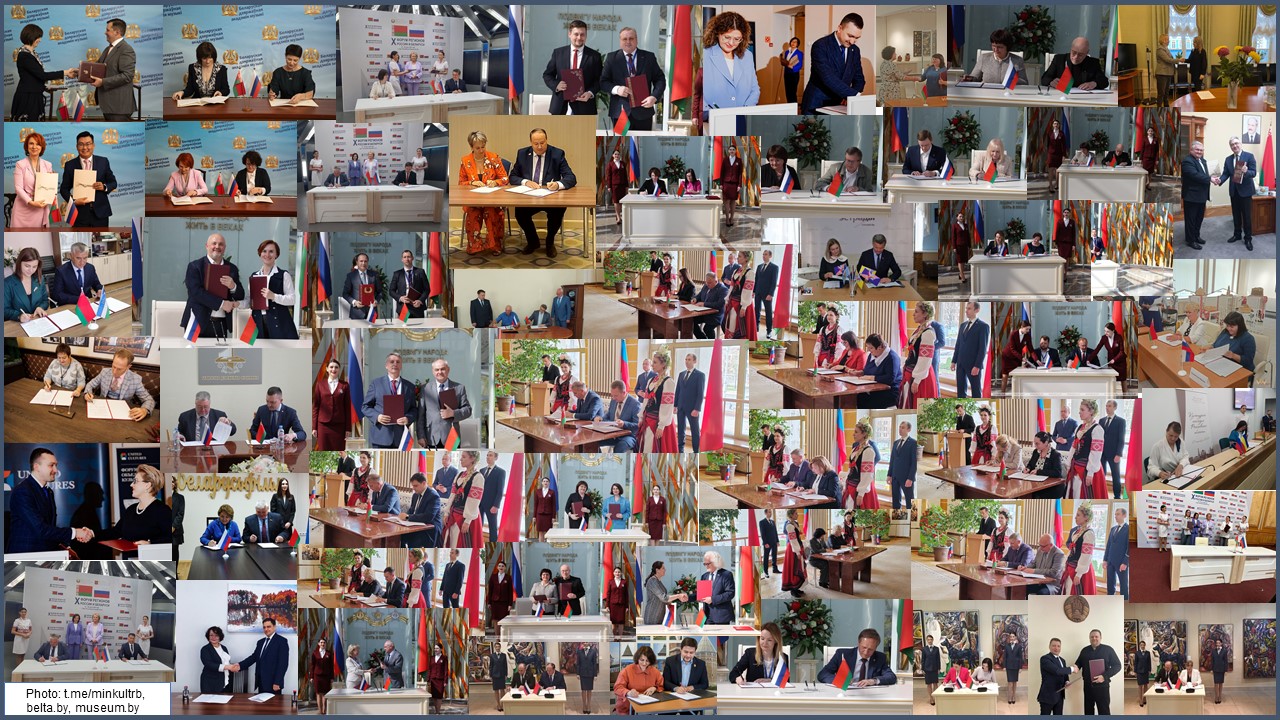 Agreements were signed on cooperation between Russian cultural and educational institutions and Belarusian ones in 2023
Agreements were signed on cooperation between Russian cultural and educational institutions and Belarusian ones in 2023
***
This research is based on public information sourced from independent and state Belarusian media collected by PEN Belarus monitoring group while recording violations in the cultural sector of the Belarus in 2022–2023, as well as from publications of the official Telegram channel of the Ministry of Culture of the Republic of Belarus in 2023, pages of the Russian organisations in the social network VKontakte, the website of the Union State, playbills of theatres and a number of other cultural institutions. Our overview does not offer the comprehensive picture of all aspects of Belarus’ absorption by the “Russian world”, but rather focuses on the impact of Russian product’s import in the Belarusian cultural sphere.
THE UNION STATE: ACTIVITIES AND PROJECTS IN THE FIELD OF CULTURE AND EDUCATION
In February 2023, at the meeting of the Ministry of Culture of the Republic of Belarus on the results of 2022, the Minister of Culture Anatoly Markevich noted “a huge interest in cooperation on the part of the regions of the Russian Federation“. In turn, the Ministry of Culture itself pays “special attention” to the implementation of the Union State projects. In June 2023, at a meeting in Viciebsk, the Chairman of the Commission of the Parliamentary Assembly of the Union of Belarus and Russia on Culture, Science and Education Nikolai Burlyaev noted that “previously, only eleven programmes were implemented in these areas, with the central event being the festival Slavianski Bazaar in Viciebsk, but now this number will increase to forty“. The budget provides funding for 14 events in 2024. In 2023, authorities restarted the festival Creativity of the Young and held Union State on Kupallie [St. John the Baptist Day] festival for the first time, where “representatives of Belarusian and Russian regions worked shoulder to shoulder in each pavilion“. The First Russian-Belarusian Museum Forum took place, the idea of which was born in autumn 2022 at the Days of Spiritual Culture of Russia in Belarus, as well as a number of traditional festivals, forums, contests and other types of cultural events of the Union State. At the IX St. Petersburg International Cultural Forum, held in November 2023, the State Secretary of the Union State Dmitry Mezentsev called “the formation of a common cultural space of Belarus and Russia” a priority and noted that within the framework of Russian-Belarusian official cooperation, the work on the preservation of historical memory and historical and cultural heritage was expanding. The Union’s plans for 2024 include celebrations of the 80th anniversary of the liberation of Belarus from Nazi invaders and the 25th anniversary of the signing of the Treaty on the Establishment of the Union State, as well as launching several museum projects, releasing joint films, publishing new books in the series Library of the Union State and other cultural activities.
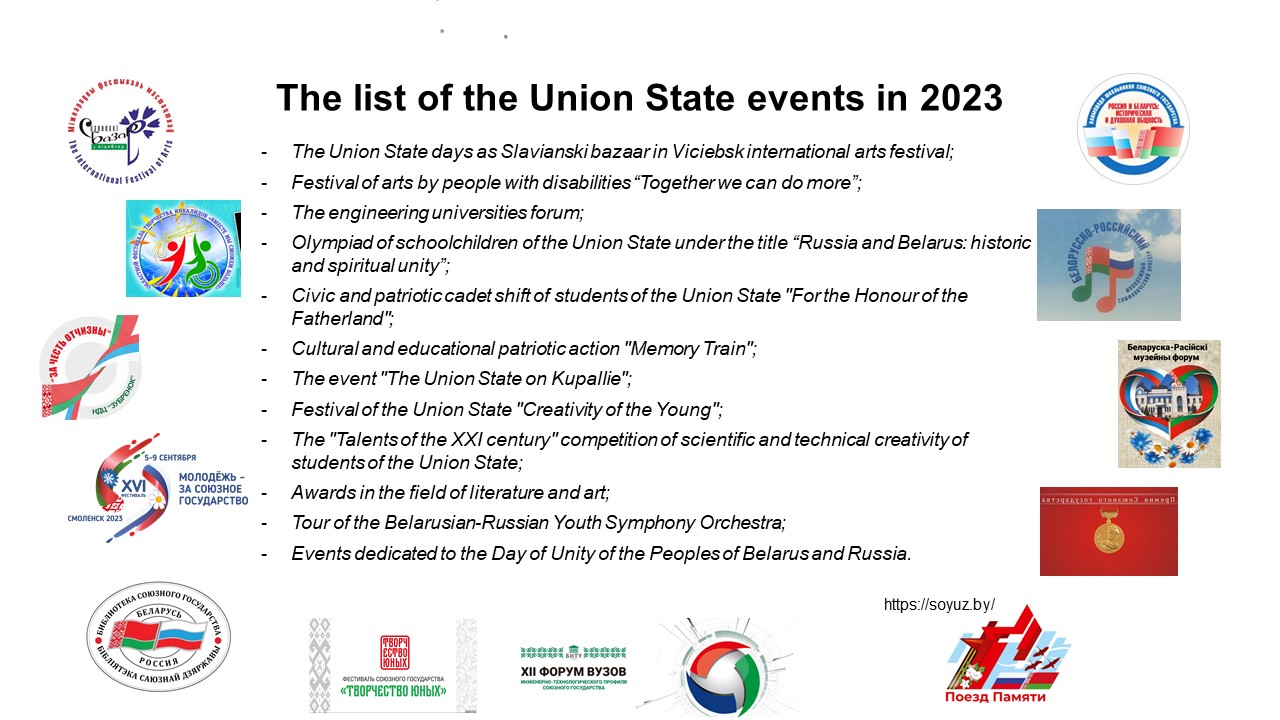
ROSSOTRUDNICHESTVO: RUSSIAN HOUSES IN BELARUS
One of the actors in promoting Russian culture in Belarus is Rossotrudnichestvo (Federal Agency for the Commonwealth of Independent States, Compatriots Living Abroad and International Humanitarian Cooperation), established back in 2008.
Rossotrudnichestvo’s mission is strengthening Russia’s humanitarian influence in the world. The 2022 report of the agency states that it is represented in 80 countries by 87 overseas representative offices under the brand Russian House. The main activities of the houses include promotion of the Russian language and Russian education abroad, youth programmes, socio-humanitarian and volunteer projects, preservation of historical memory, working with compatriots, monitoring of the rights of the Russian-speaking population, cultural cooperation, promotion of international development and informational activities.
Belarus is mentioned nine times in the annual 2022 report, twice as Belarus and seven times using it old Soviet title Belorussia, in the following sections:
– “In the 2022/2023 academic year, quotas have increased from 18,000 to 23,000 spots [for Russian speakers from abroad]. The largest number of beneficiaries of Russian quotas come Belarus, Vietnam, China, Syria, Tajikistan, Uzbekistan, Ukraine, Mongolia, Kazakhstan, Kirgizia“; “Activities to improve the qualification of specialists in the field of speech therapy, defectology and preschool education in the Russian language in Belorussia and Moldavia were in demand” (within Promotion of the Russian language and Russian Education Abroad).
– “In Belorussia in 2022, the humanitarian mission was dedicated to creating inclusive spaces, working with blind and visually impaired children and adults. Russian volunteers introduced unique methods, conducted trainings and master classes for teachers, schoolchildren and adults with special developmental needs. 400 people took part in the activities” (Social, Humanitarian and Volunteer Projects).
– “It has already become a tradition to hold the “Victory Dictation” in Abkhazia, Armenia, Belorussia, China, Egypt, France, Germany, Germany, Kazakhstan, Kirgizia, Moldova, Serbia, Tajikistan, Turkey, and Uzbekistan” (Preserving Historical Memory).
– “In 2022, 533 young compatriots from Egypt, Canada, Kyrgyzstan, Lebanon, Mongolia, Poland, Portugal, Armenia, Belorussia, Kazakhstan, Moldavia, Tajikistan, Uzbekistan, South Ossetia, Syria, Turkey, Germany, Tanzania, Azerbaijan, Israel, Finland, Palestine, Uganda, Tunisia, Serbia, Abkhazia, Bulgaria, Spain visited Russia. (…) In 2022, 150 young compatriots aged 12 to 14 from 15 countries took part in the VI World Games of Young Compatriots in Moscow. Among them were participants from Abkhazia, Azerbaijan, Belorussia, Cyprus, Egypt, Iceland, Kyrgyzstan, Moldavia, Mongolia, Serbia, Syria, Tajikistan, Uzbekistan, Sweden and South Ossetia” (Work with Compatriots).
– “Grand International Journey of Ded Moroz (‘Grandfather Frost’) is a joint project of Rossotrudnichestvo and the Government of the Vologda Oblast. Rossotrudnichestvo’s representative offices in Italy, Germany, Serbia, Belorussia, Armenia provided organisational and informational assistance in carrying out Ded Moroz’s visit to foreign countries” (Cultural Cooperation).
– “The winners [of the Honest Look international competition of informational projects for foreign journalists and bloggers writing about Russia] were young professionals from Uzbekistan, Belarus, Tajikistan, Montenegro and Iran” (Informational Activities).
In 2023, the work continued in all above-mentioned spheres. Rossotrudnichestvo’s agenda is promoted in Belarus by Russian Houses in Brest, Homiel, and Minsk, as listed on the agency’s website. In 2024, Rossotrudnichestvo plans to open a branch in Hrodna, while in 2023, it supported the creation of a local space for events “related to the Russian language, literature, culture and common history of the two countries“. Viciebsk also has its own Russian House.
The houses work with kindergartners and schoolchildren, school graduates and students, adults, and senior citizens, hold film clubs, master classes, tournaments and conferences, and are often partners of cultural, entertainment and educational events. On its VKontakte social media account, the Russian House in Brest frequently posts about the programme “Hello, Russia!” and offers trips to Russian cities as a reward for active participation in its events. There is also information about the regions of Russia, to which one can move under the programme of voluntary resettlement. A lot of attention is paid to studying in Russia: for 2024, Belarusians are allocated 1300 spots in Russian higher education institutions under the quotas of the Government of the Russian Federation. The VKontakte page informs about entrance tests, courses on preparation for exams, opportunities to get advice, as well as the extension of the terms of the admission campaign for the 2024/2025 academic year. Reviews of already admitted applicants are posted, potential students are invited to participate in various activities. The website publishes news about Rossotrudnichestvo’s flagship programme “New Generation”, in which young Belarusian specialists come to Russia for knowledge exchange with professional communities, invites to advanced training courses for Russian teachers and shares the results of the work of the literary studio “Living Book”. It is also engaged in the patriotic education of young people. For example, the project “Counteracting the falsification of the history of the Great Patriotic War” includes meetings and lectures for schoolchildren on ideologically pre-approved topics.
The Russian House in Homiel also promotes quotas for Belarusians for the admission to Russian universities. It informs about trips to the Russian cities through programmes “New Generation” and “Hello, Russia!” and serves as a platform for various kinds of events. Those events are not only aimed at popularisation of the Russian language and literature but are rather focusing on a wide range of topics, such as fashion, medicine, sports, religion, etc. The house promotes numerous events co-organised with Russia, such as arts and crafts festival The Christmas Tree of Friendship (“symbolising the brotherhood of Belarusians and Russians“), international children’s contest Music of Hope for Belarusian and Russian participants only, international contest Tell the World About Your Motherland, competition for the best work on the history of the defence and blockade of Leningrad, etc. The house invites schoolchildren to take part in various all-Russian Olympiads and alike activities. It is engaged in patriotic education of youth, supports Cultural, Educational and Scientific Forum “Slavic Meetings” (held in November for the 11th time in F. Skaryna Homiel University), donates books to school libraries (e.g. 160 books during the Russian Language Week), inaugurated a new flight from Homiel to Moscow, presenting the first passengers with Russian fairy tales and publications about the Bolshoi Theatre of Russia, and promotes the “Russian world” in Belarus in other ways.
The Russian House in Minsk regularly organises live streamed presentations about educational opportunities for Belarusians in Russia and promotes the programme of study tours to the Russian Federation “New Generation”. It informs about the activities of the Centre for Open Education, a new educational institution in Minsk, which was established on the basis of the Russian Centre of Science and Culture and conducts its work in the premises of the Russian House. The house holds master classes, lectures, meetings, and other activities. On the webpage, the organisation shares news about Rossotrudnichestvo’s activities in general, reposts information from the pages of the Russian Embassy in Belarus, other Russian houses and alike organisations. In the end of 2023, Rossotrudnichestvo informed about opening of the information and cultural centre “All About Russia”, set on the basis of the Mahilioŭ branch of the National Scientific and Technical Library, and the renovation of the scientific and educational centre of Russian studies at the A. A. Kuliašoŭ Mahilioŭ State University. At the grand opening of the latter, among other things, the transfer of “a significant number of classical fiction boos for the book fund of the centre” took place. As the head of the Russian House in Minsk Yuri Makushin said during one of the previous transfers of Russian books to the fund of the Janka Kupala Central City Library, “it is important to remain in a single cultural and information field”. His quote sums up the activities of Russian Houses in Belarus quite accurately.
We are not going to dwell on the activities to promote Russian culture by the national Public Association “Russian Society” in Belarus, but it is worth noting 2023, the organisation paid special attention to initiatives on military and patriotic education of young people.
Before the appointment of actress Viera Paliakova-Makei as the director of Minsk Theatre of Young Spectator (TYZ)[1] in April 2022, that theatre was one of the few remaining Belarusian-speaking ones in Belarus. In an interview to Belarusian state radio, the new director spoke about her refusal to work exclusively in Belarusian: “After all, we have guests coming to us, like Russians, who, unfortunately, do not know the Belarusian language. Why should we lose this audience?” Indeed, the theatre since then introduced plays in Russian. In April 2022, the premiere of the play Time Chose Instead of Them took place, followed later by Alps. Year 1941 (based on the Alpine Ballad by Vasil Bykaŭ), Figaro, Queen of Spades, Zhenya + Tanya = Love, Not a Hedgehog, Master and Margarita[2], Thunderstorm, White Nights, staged by Russian directors on the texts of Russian classics Pushkin, Kuznetsov, M. Bulgakov, Ostrovsky, Dostoevsky and contemporary playwright Anna Bogacheva. The December 2023 theatre’s playbill included 37 performances of 11 plays, 23 of those performances were the children’s New Year’s play How Uncle Au Met the New Year. Only seven out of 37, all produced under the previous director, were staged in Belarusian: children’s plays Doktar Aibalit, Pinnoccio and Thumbelina (two shows of each) and the performance for adults Dzikaje Paliavanne Karalia Stacha.
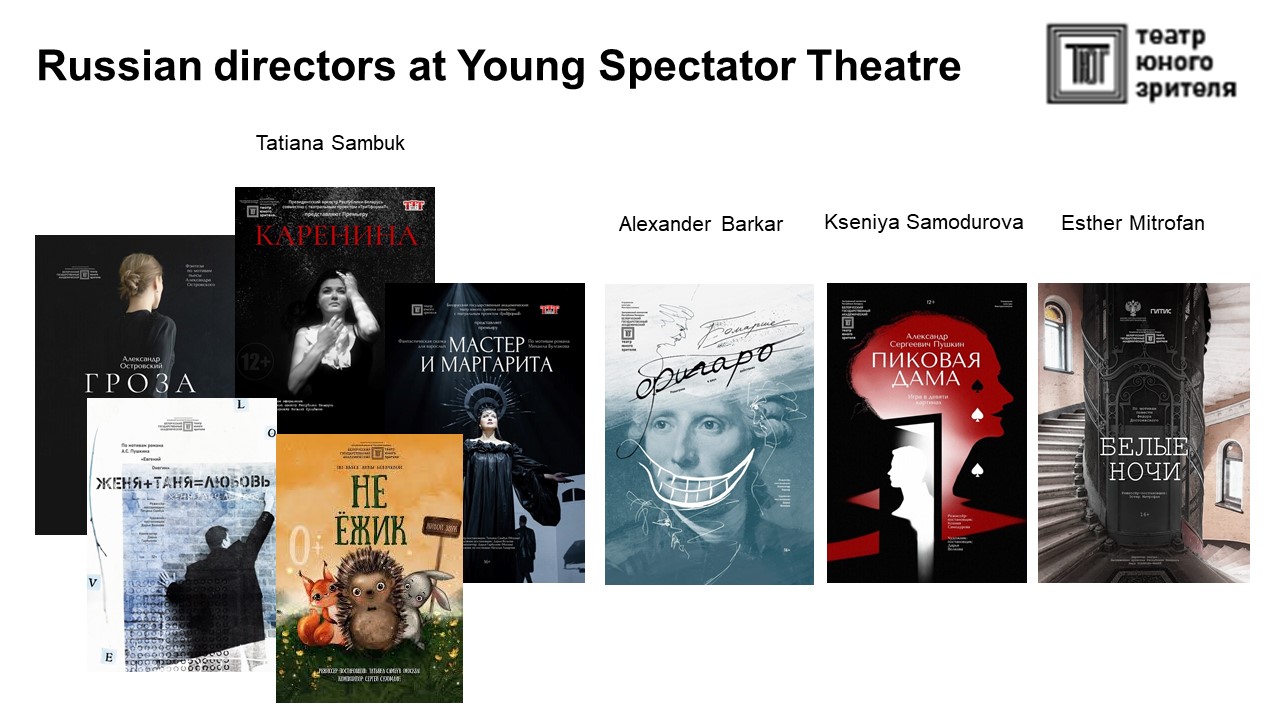
For the last couple of years, the directors, artists, musicians, actors and other specialists from Russia have been regularly invited to Belarusian theatres.
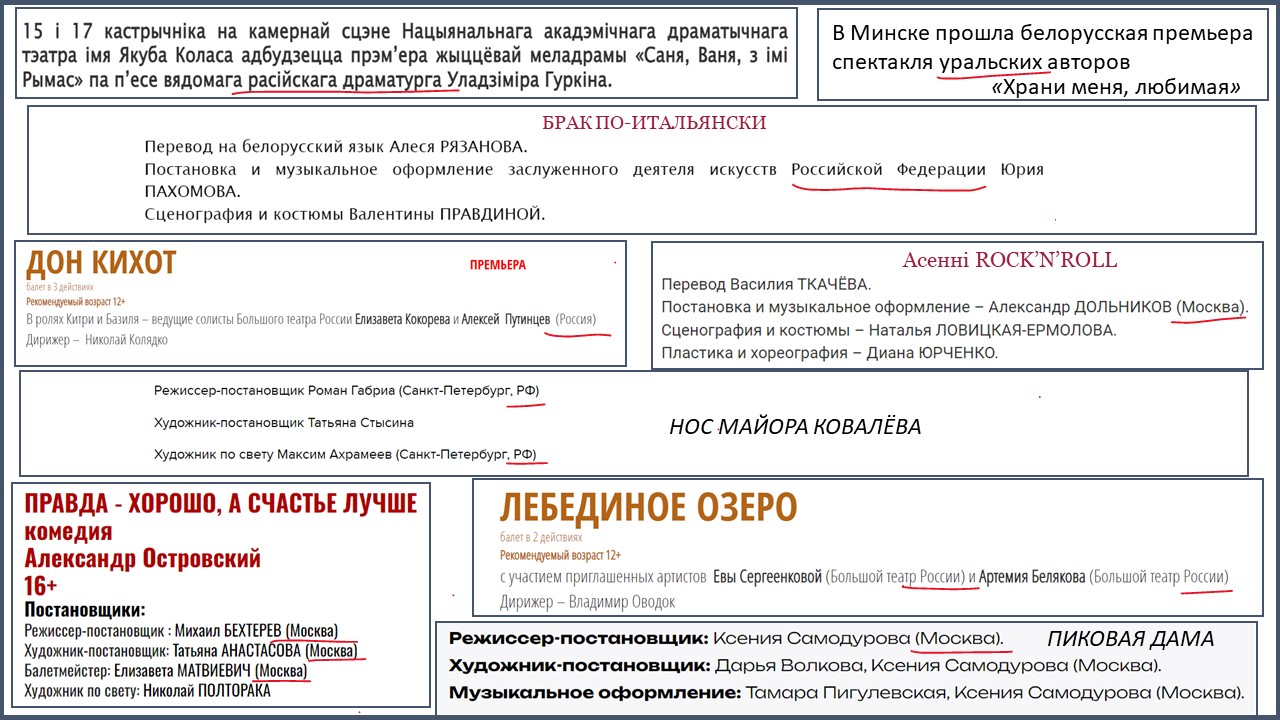 Russian presence on the Belarusian theatre stage. A series of excerpts from October posters (Jakub Kolas National Academic Drama Theatre (Viciebsk), Belarusian State Academic Musical Theatre (Minsk), Bolshoi Theatre of Belarus (Minsk), Homiel Regional Drama Theatre (Homiel), Brest Academic Drama Theatre (Brest), Young Spectator Theatre (Minsk))
Russian presence on the Belarusian theatre stage. A series of excerpts from October posters (Jakub Kolas National Academic Drama Theatre (Viciebsk), Belarusian State Academic Musical Theatre (Minsk), Bolshoi Theatre of Belarus (Minsk), Homiel Regional Drama Theatre (Homiel), Brest Academic Drama Theatre (Brest), Young Spectator Theatre (Minsk))
Since April 2022, the new director at the Brest Puppet Theatre is the Russian citizen Denis Kazachuk. In September 2023, Artem Makarov, People’s Artist of the Republic of Bashkortostan, was appointed Chief Conductor of the Bolshoi Theatre of Belarus. The theatre had been closely cooperating with the conductor since the beginning of 2023, while in June a memorandum of cooperation was signed between the Bolshoi Theatre of Belarus and the Bashkir State Opera and Ballet Theatre, where Makarov had previously worked. At the same time, he is also chief conductor of the N. I. Sats Children’s Musical Theatre in Moscow. Even before Makarov, in 2022, the Bolshoi Theatre’s artistic council selected for the position of a conductor the Russian citizen Alexei Verkhoven, who since October 2023 is also a conductor at the Governor’s Symphony Orchestra of the Pskov Region. The main choreographer is Belarusian by birth Igor Kolb, Honored Artist of Russia, who has been dancing on the stage of the Mariinsky Theater in St. Petersburg for the last 25 years. In general, the Bolshoi Theatre is one of the cultural institutions that are actively inviting and recruiting managers from Russia to replace Belarusian specialists who had been dismissed for political reasons over the past 3.5 years. Performers from the Russian Federation receive invitations as well: the October 2023 playbill lists Eva Sergeenkova and Artemy Belyakov from the Bolshoi Theatre of Russia, Angelina Vorontsova and Ernest Latypov from St. Petersburg’s Mikhailovsky Theatre (Swan Lake ballet); Mikhail Pirogov from the Mikhailovsky Theatre (Queen of Spades opera); Dmitry Sobolevsky, Elizaveta Kokoreva and Alexei Putintsev from the Bolshoi Theatre of Russia (Don Quixote ballet). As for the main cast, at a press conference dedicated to the opening of the theatre season of 2022, it was announced that the Bolshoi ballet group had been renewed by a quarter (29 new performers out of 115), mainly due to graduates of Russian academies and young artists from Moscow. The Janka Kupala National Academic Theatre is also hiring graduates of Russian universities, e.g. graduates of GITIS. At the moment, the theatre’s troupe consists of 32 people, 8 of whom, or 25 per cent of the team, are young artists from Russia, who were admitted to the theatre mainly in 2022. At the Gorky National Academic Drama Theatre, the “Russian world” paves the way with texts of Russian classics. “The moment of truth: Russian classical literature has become the muse of the Gorky Theatre. It used to be the queen-mother here, an honourable lady who was not ruling. And now, undoubtedly, she took the throne,” stated the correspondent of the state news agency Minsk-Novosti in February 2023. The journalist noted that for the third year in a row the theatre had been staging one after another premieres based on the texts of Russian classics: Kreutzer Sonata by Tolstoy, The Karamazov Brothers and The Idiot by Dostoevsky, A Month in the Country by Turgenev, Opus 40. Bespridannitsa by Ostrovsky. In fact, as far as Ostrovsky’s texts are concerned, in honour of the 200th anniversary of the author, many Belarusian theatres produced premieres based on his plays: Hot Heart (in Kupalaŭski), Thunderstorm (TYZ), Truth is good, but happiness is better (Brest Academic Drama Theatre), Balsaminov’s Marriage (Hrodna Regional Drama Theatre).
The numerous tours of Russian theatres to Belarusian venues deserves special attention as it is an unambiguous trend in the theatre life of the capital and regions. Only on the stage of the Theatre of the Young Spectator in 2023 there were tours of the Moscow “ROSTA Theatre” (performances About My Mother and About Me and The Seagull); Velikolukski Drama Theatre (Thunderstorm and Marcy Watson’s Miracle Pig); the Children’s Theatre School of Murmansk (Children of the Military Murman); St. Petersburg’s A. A. Bryantsev Young Spectator Theatre, the Baltic House Festival Theatre (My Happiness) and the Small Drama Theatre Studio (Yu and The Wizard of Oz); Ulyanovsk TYZ (The Best Thing That Happened in My Life and Sun, Fly, Crocodile). The Kazan Academic Theatre named after V. I. Kachalov came to the Kupalaŭski Theatre with seven performances (The Inspector, A Mad Day or The Marriage of Figaro, Queen of Spades, Fiddler on the Roof, Vassa, Thieves’ Ball, and a retro concert When the Lanterns Light Up).
As part of project on intercultural cooperation between the Republic of Belarus and the Russian Federation, the Perm theatre “Near the Bridge” performed on the stage of the Chamber Drama Theatre (At the Bottom), while the Salekhard Family Puppet Theatre “Zhuza” performed at the Youth Variety Theatre the play Vai and More. On the stage of the Musical Theatre there were tours of the St. Petersburg Vasilievsky Drama Theatre (Woe from Wit). Kolyada-Theatre from Yekaterinburg (False Coupon, Masquerade and Anna Karenina) and the Orenburg Cossack Song and Dance Ensemble “Zlataya Rus”, which had previously performed at the Philharmonic Society in Minsk, came to visit the Mahilioŭ Drama Theatre. The Bryansk Theatre of Young Spectators came on tour to the V. I. Dunin-Martsinkevich Theatre in Babruisk, while the Homiel and Mazyr Drama Theatres were visited by the Theatre Centre Antract from St. Petersburg (with the production There are Not Many Husbands). The tour of Russian companies is never ending at the Bolshoi Opera and Ballet Theatre. In 2023 the following performances were shown here: Voronezh (The Toy Seller, Harlequinade.NEW, Carmen.NEW and The Scarlet Flower) and Bashkir (Legend of Love) Opera and Ballet Theatres, as well as a gala concert with the participation of ballet stars from the Mariinsky Theatre, Perm Opera and Ballet Theatre and Kremlin Ballet Theatre as part of the Ballet Summer 2023 festival. Valentin Elizariev, the Artistic Director of the Bolshoi Theatre of Belarus, stated that “this project is being implemented to establish an even stronger connection in the theatre sphere with the regions of Russia” and that “this activity will be expanded, and the regions of Russia will present musical and choreographic art to the Belarusian audience, i.e. not only ballet, but also opera“. In July 2023 the Chelyabinsk Glinka Opera and Ballet Theatre (Corsair, The Masquerade Ball) and the State Academic Theatre of Classical Ballet of N. Kasatkina and V. Vasilyov (Cinderella) visited the Bolshoi on tour. In September 2023, they were followed by Mariinsky Opera and Ballet Theatre (Russian Hamlet, Cinderella), Rostov Musical Theatre (opera Turandot and ballet Spartacus). Bolshoi Theatre of Russia (The Tsar’s Bride and Ivan the Terrible) came in November, and Samara Opera and Ballet Theatre (Love for Three Oranges) toured in December.
In addition to tours, theatre specialists from the Russian Federation come to Belarus to hold master classes, seminars, and creative meetings, participate in theatre laboratories, forums and festivals, and act as experts at competitions. The managers of cultural institutions are included in the official delegations in order to establish contacts and negotiate on the development of further cooperation with the theatre institutions of Belarus. For example, on 14 September 2023, a memorandum of cooperation was signed between the Brest Drama Theatre and the Samarkand Russian Drama Theatre. On 21 September 2023, a memorandum of cooperation was signed between the National Theatre of the Belarusian Drama and the F. Volkov Russian Drama Theatre in Yaroslavl. On 8 October, a signing of a cooperation agreement was held between the Minsk Youth Variety Theatre and the Salekhard Family Puppet Theatre Zhuza. During the visit of the delegation from the Novosibirsk region of the Russian Federation to Belarus, 10 agreements on cooperation with Belarusian cultural institutions were signed, including with three theatres: the National Theatre of the Belarusian Drama, the Brest Puppet Theatre and the Belarusian Theatre Lyalka. Such agreements envisage joint Belarusian-Russian creative meetings, seminars, master classes, contests and festivals, exchanges, and alike activities.
There are also examples of direct funding, and thus the possibility to financially influence the activities of theatres. In April 2023, Russian theatres in ten countries were approved for financial support from the Russian Federation, co-sponsored by the non-profit organisation Russian Seasons, among them two from Belarus: the Gorky National Academic Drama Theatre and the Hrodna Puppet Theatre. The assistance included the purchase of stage equipment and support for premiere productions. One of them was the play Pushkin’s Fairy Tales, which premiered at the Gorky Drama Theatre in December 2023 thanks to the support of the Ministry of Culture of the Russian Federation and Russian Seasons NGO.
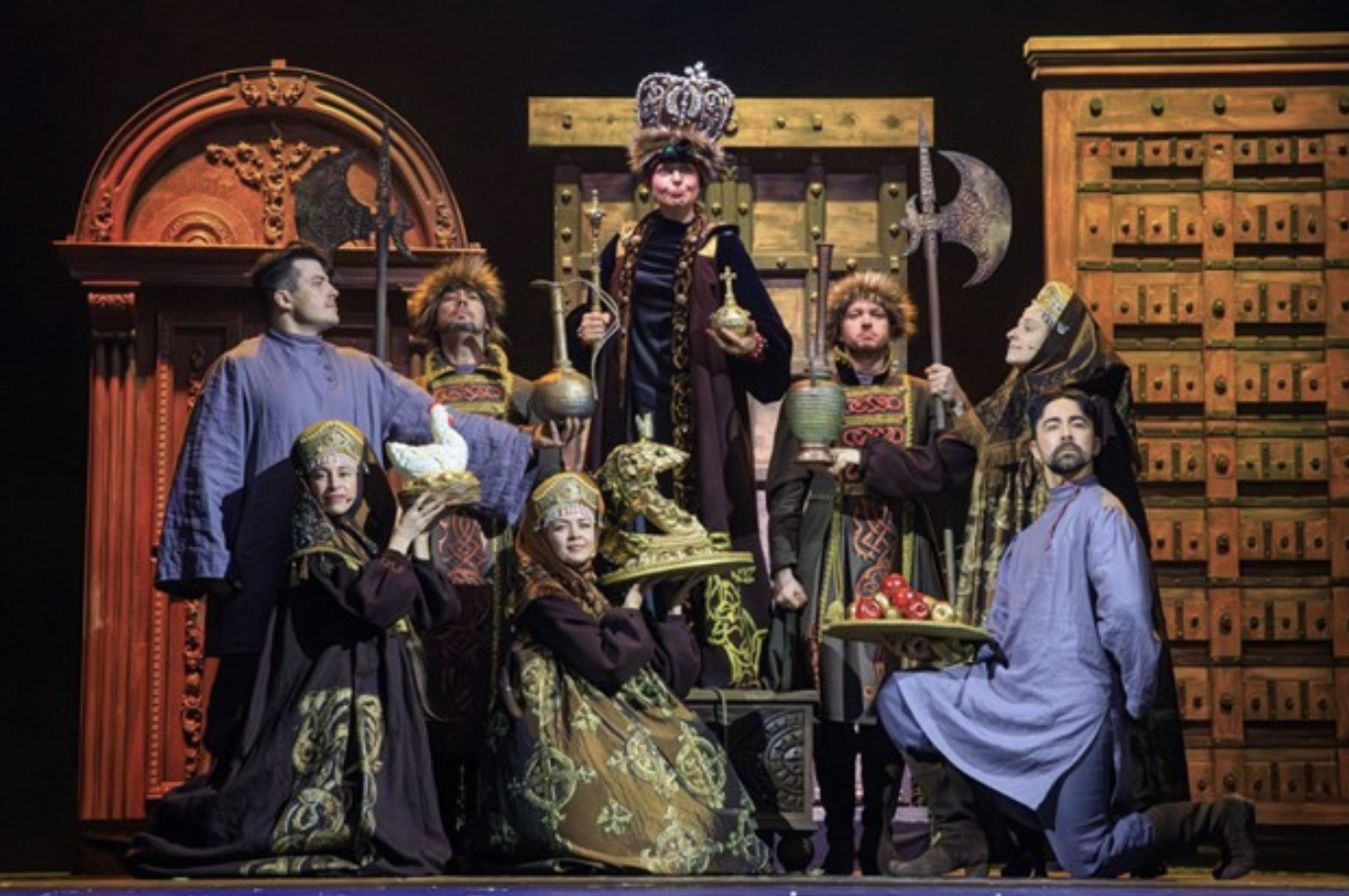
(©) Anna Stefkina and Yulia Romankova (https://www.rustheatre.by/)
This report does not list all the Russian culture themed art exhibitions that took place in Belarus in the recent years but rather pays attention to their topics. For instance, the V. Karatkievič Museum in Orša held an exhibition To Serve the Fatherland with Word and Soul… dedicated to the life and work of Fyodor Tyutchev. The exposition was timed to the Day of Unity of the Peoples of Belarus and Russia and came to Orša from the Russian State Memorial Historical and Literary Museum-Reserve of F. Tyutchev “Ovstug”. The Russian-Belarusian exhibition The Beauty and Traditions of Folk Costume took place in the premises of the National Library of Belarus. Representatives of the Russian Embassy and the Russian House in Minsk took part in the opening of the exhibition. “The exhibits reflect the originality and diversity of cultures of the fraternal peoples of Russia and Belarus, as well as centuries-long peaceful coexistence of different ethnic groups on the territory of our common homeland,” the page of the Russian Embassy in Belarus states. The exhibition Russian Atlantis opened in Dokšycy on the City Day. A few months later, it moved to Polack cinema “Motherland”. “With such projects we return our lost heritage, return White Russia“, said one of the guests of honour, the president of the Eurasian Business Club Valery Loskutov. An exhibition Union Family: Together We Are Strong, organised for the 895th anniversary of Hrodna with the support of the Consulate General of Russia in Hrodna and the Russian Centre of Culture and Science in Brest, was held on the site of the Festival Centre in Hrodna. Head of Rossotrudnichestvo in Belarus Yuri Makushin called Hrodna “the most attractive Belarusian city for Russian tourists” and wished Russian tourists to have more reasons to come there. An exhibition of artists of the Tver regional branch of the All-Russian creative Public Association “Union of Artists of Russia”, Tverskaya Zhizn, was held in the Orša V. Gromyko City Art Gallery. In the Oval Hall of the New Castle in Hrodna, the exhibition Amto (Hello), Koryakia! from the private collection of Lyudmila Kayurova (Russian Federation) took place. The Ministry of Culture of the Kamchatka region provided support. The exhibition Vologodchina Laces from the collection of the Vologda State Historical-Architectural and Art Museum-Reserve was shown in the Vankovič House and Museum in Minsk with the support of the Rossotrudnichestvo representative office in the Republic of Belarus. The Viciebsk Regional Museum of Local Studies organised an exhibition Family in Spirit: Together in the Earthly and in the Heavenly Kingdoms. The Luban Museum of Folk Glory hosted an exhibition The History of Russia in Shawls, provided by the Pavlovo-Posad Museum and Exhibition Centre and an agreement on joint projects between the two museums was signed. The exhibition hall of the Vaščanka Picture Gallery in Homiel hosted the exhibition of the infamous People’s Artist of Russia Nikas Safronov Infinite History. The branch of the Brest Regional Museum of Local Studies “Art Museum” hosted the opening of the exhibition Viktor Shapov. From Penza with Love…, which presented canvases from the funds of the K. A. Savitsky Penza Art Gallery. That project was part of the official cultural exchange between Belarusian and Russian cities set up by the 2021 agreement on cooperation between the Brest (Belarus) and Penza (Russia) regions. Oleg Murashev, Consul General of Russia in Brest, noted that “the rapidly expanding cultural ties between Brest region and Russian regions are the key to successful multifaceted cooperation between the Russian Federation and the Republic of Belarus”. He expressed hope “for the intensification of inter-museum contacts in 2024“. The National Historical Museum of the Republic of Belarus opened the exhibition Sergei Rachmaninov: I am a Russian Composer provided by the Russian National Museum of Music.
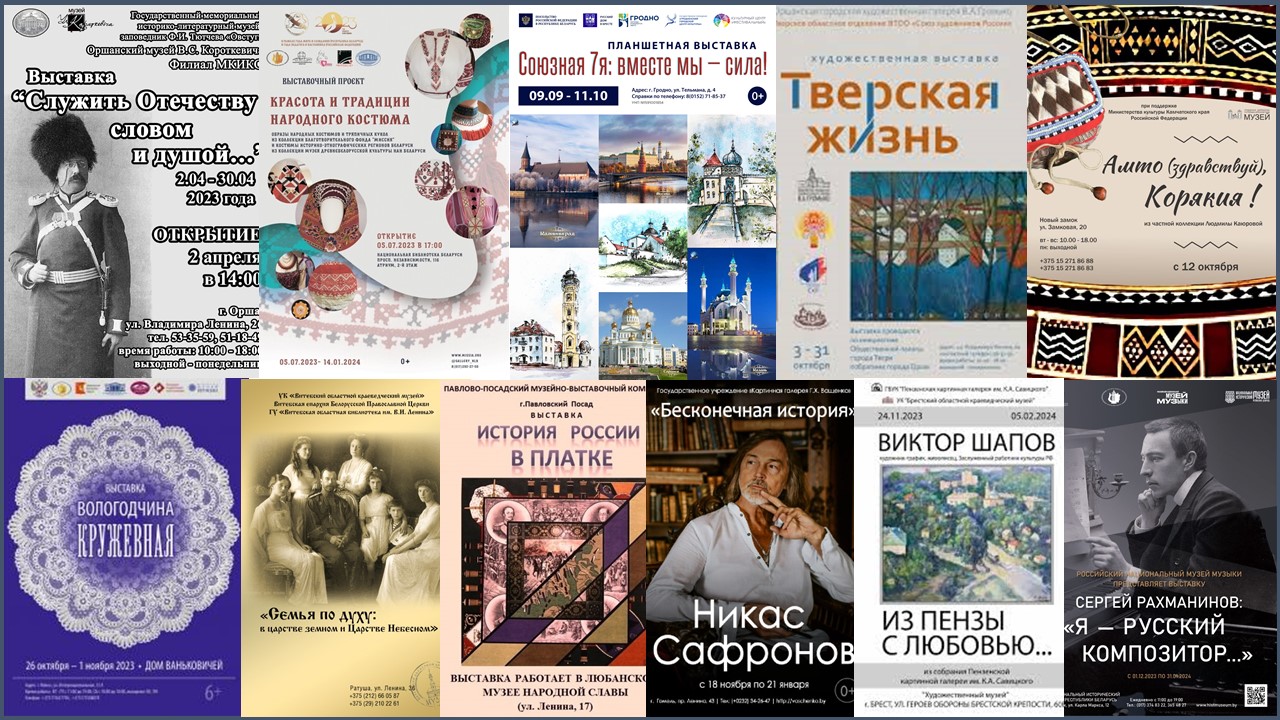 Posters of the afore-mentioned exhibitions
Posters of the afore-mentioned exhibitions
In 2023, Russian exhibitions took place in Belarusian museums as part of Belarusian-Russian dates commemoration, for instance, the Day of Unity of the Peoples of Belarus and Russia, the Day of the Union State, as well as the Days of Culture of a particular region of the Russian Federation in Belarus. At the beginning of 2023, the heads of the National Historical Museum of the Republic of Belarus and the Federal Ryazan Historical and Archaeological Museum-Reserve discussed the issues of cooperation; in April, an agreement was signed between the Viciebsk Regional Museum of Local Studies and the Russian State Museum “Smolensk Fortress”. During the First Russian-Belarusian Museum Forum, held in Minsk on 11-12 May 2023 at the National Library of Belarus, the parties signed 43(!) agreements on cooperation between museum institutions of the two countries. Among them were agreements between the National Art Museum of Belarus and the State Russian Museum; the Belarusian State Museum of the History of the Great Patriotic War and the Russian National Museum of Music; the I. Staurovsky Slonim District Museum of Local Studies and the All-Russian Historical and Ethnographic Museum; the National Historical Museum of Belarus and the Pskov State United Historical, Architectural and Art Museum-Reserve; the Homiel Regional Museum of Military Glory and the Moscow Victory Museum (the Museum of the Great Patriotic War). According to the director of the Moscow Victory Museum, “Belarusian and Russian museum workers actively co-operate in various areas.” The Minister of Culture of Belarus, in turn, stated that “the meeting within the framework of the first Russian-Belarusian museum forum is a proof of systematic, close and constructive cooperation between the Ministries of Culture of the Republic of Belarus and the Russian Federation.” The minister presented Alla Manilova, the head of the Russian delegation and the new director of the Russian Museum, with a badge “For Contribution to the Development of Belarusian Culture”.
The signing of agreements continued throughout the year. During the X Forum of Regions of Russia and Belarus, a cooperation agreement was signed between the National Historical Museum of the Republic of Belarus and the National Museum of the Republic of Bashkortostan, as well as the Russian State Museum “Smolensk Fortress”. During the Days of Crimea (the territory of Ukraine occupied by Russia) in Belarus, a document on joint activities was signed between the Pružanski Palacyk Museum Estate and the Yalta Historical and Literary Museum. During the Days of Culture of the Rostov region, the following Belarusian museums signed agreements with their Rostov colleagues: the National Historical Museum of the Republic of Belarus, the National Centre of Modern Arts of Belarus, the State Museum of the History of Belarusian Literature (with the Taganrog State Literary and Historical-Architectural Museum-Reserve and the M. A. Sholokhov State Museum-Reserve), the National Art Museum, the Brest Regional Museum of Local Studies (with the archaeological reserve “Tanais”), and the State Museum of the History of Belarusian Literature (with the M. A. Sholokhov State Museum-Reserve). Also, following the sixth meeting of the Business Cooperation Council between the Republic of Belarus and the Novosibirsk Region, ten cooperation agreements were signed between Belarusian and Novosibirsk cultural institutions, including two museums: the National Art Museum and the National Historical Museum. At the end of November 2023, a five-year cooperation agreement was signed between the State Historical and Cultural Institution “M. K. Ogiński Estate Museum” and the Federal State Budgetary Cultural Institution “State Art and Architectural Palace and Park Museum-Reserve “Tsarskoye Selo” from Russia.
The signing of such cooperation agreements provides for a subsequent increase in the number of joint museum projects, exchanges of temporary expositions, possibilities to participate in master classes, seminars, conferences, and other types of Russian presence in the visual arts and museum spheres of Belarus. During the same museum forum, the director of the National Historical Museum of Belarus, Aliaksandr Chramoj, announced “a decision to organise joint museum nights: in Russia with the participation of Belarusian specialists, and in Belarus with the involvement of Russian colleagues. Moreover, there is an agreement that Belarusian museums should be included in associations of Russian museums according to their profiles. For example, in literary, military and patriotic or historical areas, all museum-reserves will be included in a relevant association“. Forced unification and takeover of Belarusian organisations by Russian ones was also present in the work of creative unions of Belarus (artists, designers, cinematographers). Those non-commercial independent organisations were forced to join the structural units of Russian unions [3].
Let us quote just some excerpts from music related news in the state media of Belarus in 2023: “Together with Minsk artists, Mahilioŭ and Moscow artists will perform“[4], “A solemn concert dedicated to the Day of Unity of the Peoples of Belarus and Russia took place in Minsk. National collectives and folk artists of the Union State performed on the stage of the Grand Hall of the Palace of the Republic“[5], “More than 60 artists from Belarus and Russia will stage a light show in Brest”[6], “Lube band, Zara and Dmitry Malikov will sing in Minsk”[7], “People’s Artist of Russia opened a new organ season at the Belarusian Philharmonic Society“[8], “Tour of the Youth Belarusian-Russian Symphony Orchestra”[9], “Ten orchestras from Belarus and Russia, most of them military, will take part in the festival“[10], etc.
After the protests of 2020, the Belarusian independent scene is under political persecution and legislative pressure. With the introduction of the Register of organisers of cultural and entertainment events, every planned concert and its participants have to be checked by ideologists and law enforcement agencies for loyalty to the regime; only a few performers pass such a check. European performers have either refused or are not allowed to perform in Belarus. Russian musicians, who spoke out against the war with Ukraine unleashed by Russia, cannot come on tour either. The music venues of Belarus mainly host concerts of ideologically verified Russian musicians: supporters of military aggression and authors of patriotic songs. Pro-government Russian artists brought perform as headliners on the Days of Cities: Oleg Gazmanov in Homiel (2022), the band Dabro in Brest (2022), Alexander Marshal in Hrodna (2023); The duo Filatov & Karas at the Independence Day of Belarus in Minsk (2023). Russian singers come to national holidays, e.g. Sergei Penkin and Irina Dubtsova performed on Machine Builder’s Day (2023), while Oleg Gazmanov, who is the sanctions lists of a number of countries for spreading disinformation and propaganda, sang at Musical Evenings in Mir Castle (2023). Naturally, Russians performed at the concerts on the occasion of Russia Independence Day (12 June) in Minsk: Elena Vaenga, Alexander Buynov, Oleg Gazmanov, SHAMAN and others in 2022; the Lube band, Dmitry Malikov, Zara and other pop artists, Nizhny Novgorod Gubernsky Orchestra, Kaliningrad concert ensemble of marines “Black Berets” in 2023. Another entirely pro-Russian music event is the Slavianski Bazaar in Viciebsk that takes place every summer. In 2023, its opening ceremony was attended by Russian pop singers and celebrities such as Lev Leshchenko, Angelina Vovk, Dmitry Kharatyan Sergei Lazarev, Vladimir Presnyakov, Anna Semenovich, Alexander Marshal, Vadim Samoilov, the group “Na-Na” and other pro-government cultulral actors from Russia. According to Anatoly Linievič, the First Deputy Chairman of Viciebsk Regional Executive Committee, the festival “cannot be imagined without the participation of Russian colleagues.”
This is how the posters of one of the largest venues of the capital looked like in late autumn of 2023. Against the background of several concerts of Belarusian performers (violin show “Antikona”, world hits performed by A’StorioPLUS, New Year’s concert by the 2022 KVN Supreme League champions “Dr House” and a couple of other events), there is an overpopulation of Russian product: performers, performances, shows.
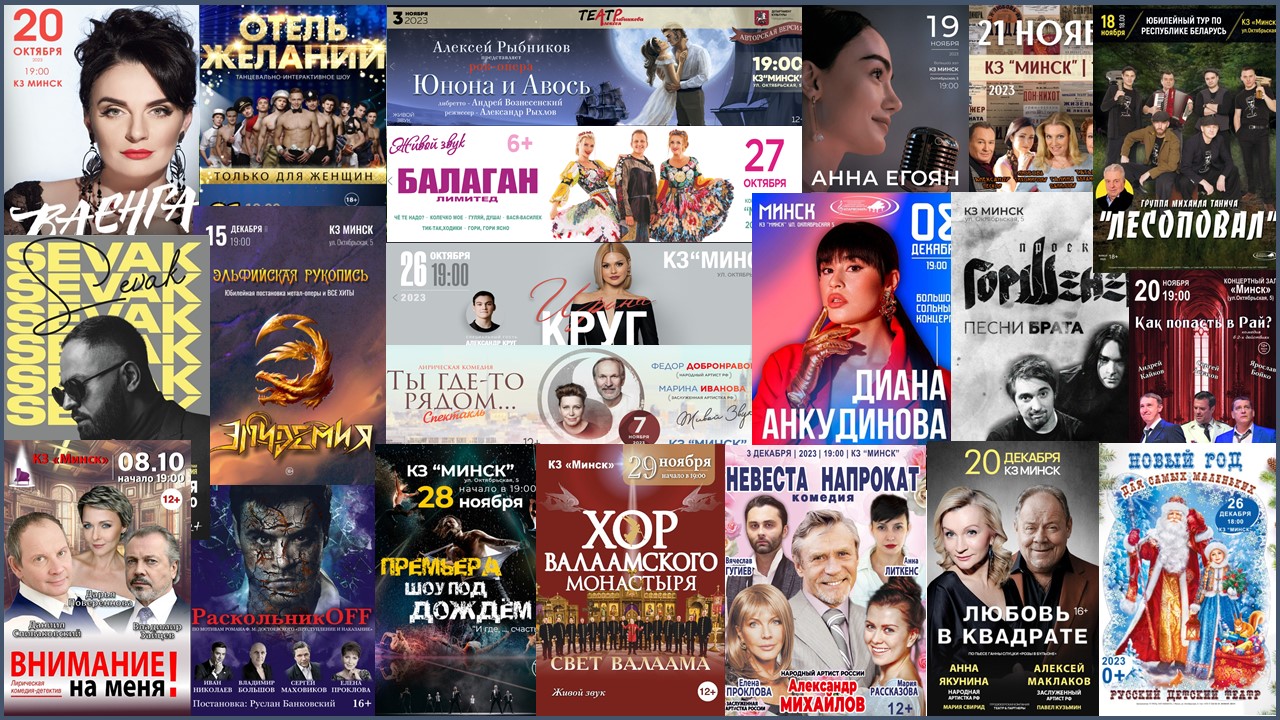 Tour of Russian performers, theatre productions and shows in October – December 2023 at the venue of the Minsk Concert Hall
Tour of Russian performers, theatre productions and shows in October – December 2023 at the venue of the Minsk Concert Hall
The Minsk Belarusian State Philharmonic hosts plenty of imported Russian concerts. In October-December 2023, the Perm Choir, the Astrakhan State Philharmonic Chamber Choir, the Rostov Academic Symphony Orchestra, the Kaliningrad Symphony Orchestra, the Vladimir Governor’s Symphony Orchestra, the N. A. Rimsky-Korsakov International Youth Symphony Orchestra, the Siberian Russian Folk Choir, soloists of the St. Petersburg Concert performed there, as well as the Ulyanovsk Academic Symphony Orchestra “Gubernatorsky”, the “Russian Piano School” project, the Chamber Ensemble “Soloists of Moscow” and others performed there. A significant part of those concerts was held during the Days of Culture of Russia (Tatarstan, Rostov region, etc.) in Belarus.
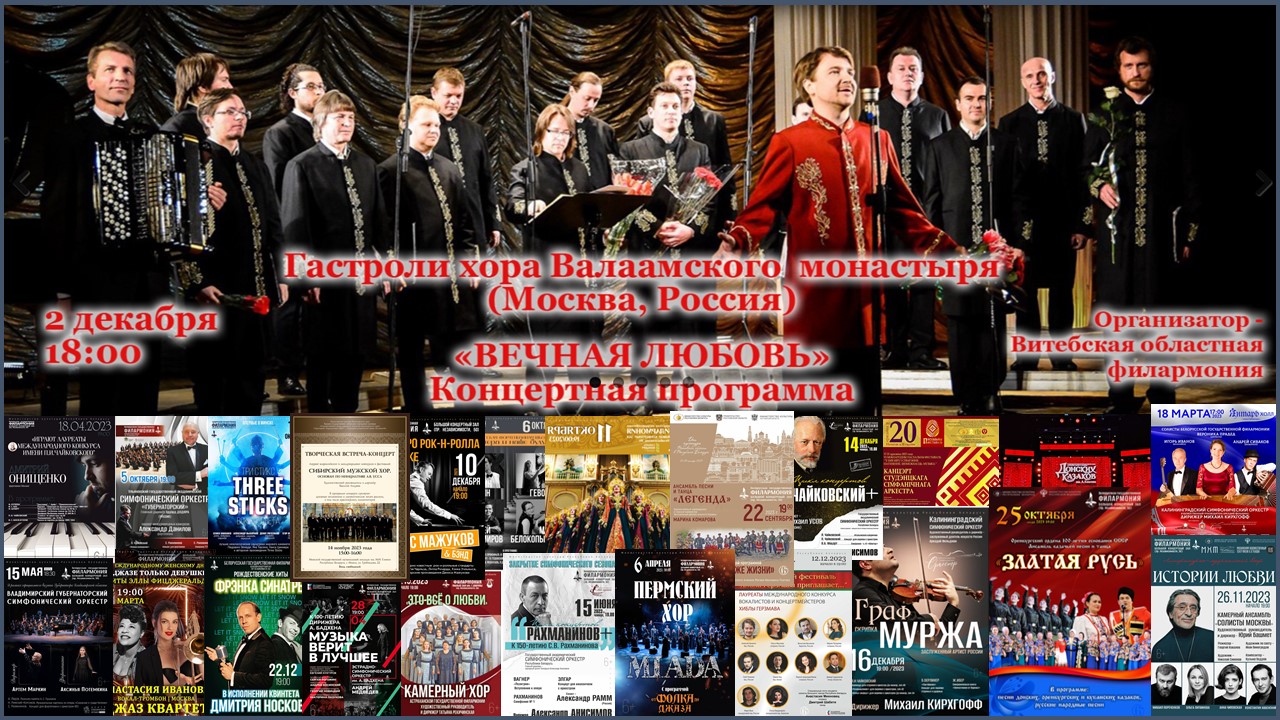
A tour of Russian classical music performers in October – December 2023
Speaking of classical music, one of the products of the Union State is the Youth Belarusian-Russian Symphony Orchestra, which this autumn sent on tour 60 students of music universities of the Russian Federation and 30 students of the Belarusian State Academy of Music.
As with the museum business, there are also awards to Russian cultural figures for their contribution to Belarusian art in the music industry. For example, at the Song of the Year of Belarus contest Russian pop musician Aleh Shaumarov received the award For Contribution to the Development of the Music Industry. Alexei Vasilyev, rector of the St. Petersburg Rimsky-Korsakov Conservatory, and Valery Shkarupa, rector of the M. P. Mussorgsky Ural State Conservatory, were awarded the title Honorary Professor of the Belarusian State Academy of Music.
Like in theatre, museum, library and other cultural spheres, there is a growing number of Russian-Belarusian cooperation agreements in the field of music education, which envisage joint concerts, competitions, master classes, etc. For example, in April 2023, as part of the Minsk – Kazan televised broadcast, an agreement on cooperation in the sphere of cultural, educational and scientific activities was signed between the National Gymnasium-College of the Belarusian State Academy of Music and the Kazan N.G. Zhiganov State Conservatory. In June 2023, an agreement was signed between the Gymnasium-College and the Secondary Specialised Music College of the Republic of Bashkortostan. The agreement outlines “a plan of creative cooperation” between the Gymnasium-College and the Secondary Specialised College of Music of Ufa. Ufa. In September 2023, agreements were signed with the Gnessin Russian Academy of Music and the Kaliningrad Regional Music College named after S.V. Rachmaninov. In December 2023, agreements were signed with the Glinka Choir College and the M. P. Musorgsky St. Petersburg Music College. During the joint meeting of the Council on Professional Music Education, agreements on bilateral cooperation were signed between the Belarusian State Academy of Music, the Tchaikovsky College of Arts (Ulan-Ude) and the Surgut College of Music. In September 2023, the delegations of the Minsk M. Glinka State Music College and Surgut Music College signed a cooperation agreement between these two educational institutions. “Both sides expressed their willingness to interact in the creative sphere and confidence that cultural cooperation will contribute to the development and integration of traditions in the field of art.” The Brest Ryhor Šyrma State Music College will cooperate with the Penza A. A. Arkhangelsky Music College, the Belarusian State Philharmonic and the Minsk M. Glinka State Music College and the Viciebsk Regional Philharmonic will cooperate with the Novosibirsk cultural institutions. The Belarusian State Philharmonic Society and the Mordovian State Philharmonic Society agreed on a two-year cultural exchange in 2024-25. As part of the St. Petersburg Cultural Forum (November 2023), the Belarusian Philharmonic also signed memoranda of cooperation with the St. Petersburg State Capella and the St. Petersburg Concert Agency.
Voices of cultural figures in Belarus:
“The influx of Russian culture is not a creation of one’s imagination, this is something already present every year, more and more vividly”.
“The promotion of Russian culture is being felt more and more: on the shelves of bookstores, on the shelves of Karona and Susiezdzi [supermarket chains in Belarus] as well. And those concerts… These are all Russian singers and Russian books.
“When you stand on the bus stop and read playbills, you realise that everything is over: we are already part of the “Russian world”… this expansion is now taking place with great force“.
“This started in the entertainment sector, maybe in the 2022, and now, in 2023, expands to theatres and museums”.
“This is not just some invisible trend, but a very visible expansion of Russian culture into Belarusian culture. This is what changed since last February [2022], and this change is very real. The other day [May 2023] there was a Belarusian-Russian museum forum, to which representatives from the Hermitage, Tretyakovka came, and they all want to sign cooperation agreements, they want to make exhibitions here. Expansion… It is understandable: the place has been vacated, foreign cultural figures almost do not travel, the only option left is Russia… Russia’s interest is obvious, this expansion is a part of the general strategy, not only related to culture“.
These observations of the actors of the cultural sphere of Belarus synchronise with the facts about the scale of Russification of the country described in this overview. The expansion of Russian culture in Belarus does not end with the above-mentioned sectors: theatre, music, fine arts or museums. The same processes can be observed in the sphere of literature and librarianship, such as displacement of Belarusian authors and editions by Russian ones; in the sphere of heritage and preservation of historical memory, e.g. anti-Western rhetoric, distortion of historical truth in favour of Russia. Russification is under way in the film industry, with guest Russian stars and directors invited to work on Belarusian cinema and with the growth of the volume of Russian content in the cinemas of the country. In the system of education, Russia works with young Belarusians and their teachers on popularisation of the Russian language and culture. In the urban environment, the Russian language and culture are imposed. The process of Russification is supported inside the country by the anti-Belarusian propaganda of the state media and encouragement of pro-Russian activists who attack the Belarusian national culture with impunity.
Changes in the cultural sphere of the country related to its Russification raise questions about the cultural and political identity of Belarus. The formation of a common cultural space[11] of the two countries, which is being implemented especially zealously in the last couple of years, is a real threat to Belarusian sovereignty and identity. As history shows, it is better to exaggerate the threat coming from Russia than to underestimate it.
 Opening of the monument to the Russian ruler and military leader Alexander Nevsky in Minsk on14 November 2023 (© BELTA)
Opening of the monument to the Russian ruler and military leader Alexander Nevsky in Minsk on14 November 2023 (© BELTA)
- Vera Polyakova-Makey was appointed to replace Vladimir Savitsky, who was dismissed from the theatre for political reasons (according to available information).
- The Master and Margarita was produced back in 2021 by the TriTformat Theatre Project, directed by Vera Polyakova.
- From an interview with a Belarusian cultural worker (research).
- https://t.me/minkultrb/17600.
- https://t.me/minkultrb/18793.
- https://www.belta.by/culture/view/bolee-60-artistov-iz-belarusi-i-rossii-ustrojat-svetovoe-shou-v-breste-549639-2023/.
- https://blizko.by/notes/gruppa-lyube-zara-i-dmitriy-malikov-spoyut-v-minske-gde-i-kogda-_nm2.
- https://dzen.ru/a/ZQs_h9qB0HHqCsOp.
- https://t.me/minkultrb/27102.
- https://profkultbrest.by/mezhdunarodnyj-parad-orkestrov-stanet-glavnoj-fishkoj-dnya-goroda-v-breste.html.
- Russian language abroad. Special issue. (p. 12)
